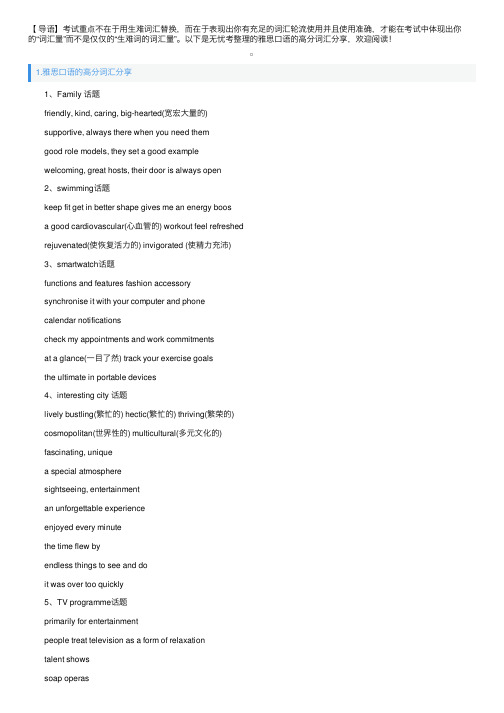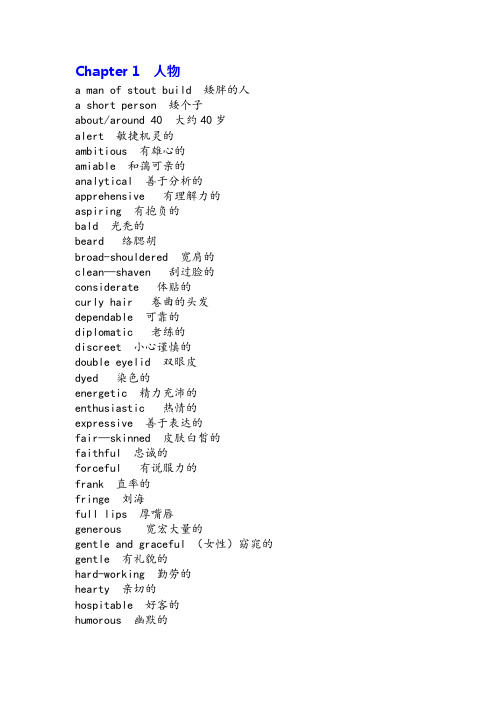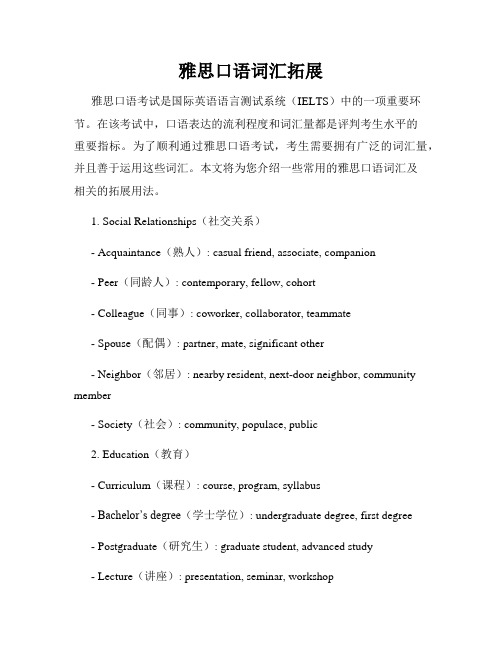雅思口语高分巧用亮点词汇
雅思 口语 必背 精简

1. What do you think are the main causes of road accidents?2. Do you know what to do in case of emergency?3. Does your name have any special meaning?4. Where were you come from?5. What kind of landscape surrounds your hometown?6. Will your life change a lot after you immigrate to ABC?7. What is the difference between Beijing and your hometown?8. What are the main places of interest in your hometown?9. What is the climate like in your hometown?10. What is the character of the people like in the region where you live?11. What are the differences in accent between the people of your hometown and Beijing?12. What is people"s favorite food in your region?13. How do you make dumplings?14. What do you do during the Spring Festival?15. Why is the Spring Festival so important to Chinese people?16. Can you describe one of the main festivals celebrated in your country?17. Tell me something about the Lantern Festival.18. Tell me something about the Qing Ming Festival.19. Tell me something about the customs of your country.20. How long have you lived in Beijing?21. What is the weather like in Beijing?22. How do you compare the climate in Beijing with that in your hometown?23. What place in Beijing do you like best? Why ?24. Which is the worst place you"ve been to China?25. Which is the best place you"ve been to China?26. What places in Beijing should a foreigner visit? Why?27. What are the major social problems in Beijing? How can they be solved?28. What is the biggest problem China faces?29. What places in Beijing should a foreigner visit? Why?30. Could you tell me something about your family?31. Have you any children?32. What is your child"s name? Does his name have a meaning?33. What does your wife/husband do?34. When did you get married?35. Describe your wedding.36. How have weddings changed in recent years?37. Are there any special customs about wedding in your region?38. Describe a traditional wedding ceremony.39. Where did you go for your honeymoon?40. Did you have to ask for permission from your parents before you got married?41. Is it acceptable for couples to live together without marrying?42. Where do you think a newly couple should live? Living with their parents or on their own?43. What responsibilities should a couple take?44. How do Chinese usually celebrate birthdays?45. Are there any traditions concerning the birth of a baby?46. What kind of parent do you intend to be?47. What do you think of One-Child Policy in China?48. Why do people in China traditionally want to have a son?49. What difficulties do Chinese farmers have concerning their old age?50. What do you think needs to be done in order to relieve the farmer"s worries?51. What hope or fears do you have for your children?52. What sort of culture do you hope your child will grow up in?53. Are you going to bring up your child differently from the way you were brought up? How?54. Do you enjoy shopping?55. Who does most of the shopping in your family?56. What are you good at cooking? What is your favorite dish?57. Who does most of cooking in your family?58. Is there *** discrimination in China?59. How do you sum up women"s conditions in China?60. What are the causes of *** discrimination?61. Should government pay certain salaries to those housewives? Why or why not?62. Would you want your wife to continue with her career or to stay at home taking care of the household after you get married?63. Have you ever wished to be one of the opposite ***? Why (why not)?64. What would you do if your next-door neighbour were noisy nearly all the time?65. Do you have a lot of friend?66. What does friendship mean to you? What kind of people do you make friend with?67. What is your major?68. How do you like your major?69. When and where did you graduate? What qualifications have you obtained?70. Do you still remember your school days?71. What impressed you most when you were at university?72. Which is the best university in your country?73. Could you sum up your own study habits in a few points?74. What do you think of the practice of setting up key schools in primary and secondary school education in China?75. Do you think the subjects you are studying today are relevant to present-day society? Why ?76. What do you think education should be? Should it be a process of learning what is useful for your future life or should it be simply learning for enjoyment? Why?77. What do you do for a living?78. What do you do in the office every day?79. Since your job seems too professional to me, could you explain it in detail?80. What are your job prospects?81. If you had the opportunity to change your job, what would you do with it?82. Do you have any ambitious?83. Will any possible future changes affect your job in any way?84. What are your spare time interests?85. How do you spend your weekends?86. What is your favorite sport? What are the rules?87. What is the most popular sport in your country?88. What are the sporting facilities like in your university/Beijing?89. What do you know about Qigong? Do you believe in Qigong?90. What do you do in your spare time?91. Do you often read newspapers? If not, why ones do you read?92. What do you think of computer?93. Do you think computer has changed our life so much?94. Do you often go to the cinema/theatre?95. What kind of films do you like best?96. Do you often watch TV? What is your favorite program?97. Do you think watching TV too much is a waste of time?98. What kind of music do you enjoy?99. Who is your favorite film star? Will you describe him/her to me?100. Do you enjoy travelling?101. Where have you been travelling to? Which place interested you most? 102. Do you smoking?103. Do you think smoking is a problem that needs special attention and has to be solved? If so, why?104. What do you know about ABC?105. What problem do you think you will have in ABC?106. How will you overcome the difficulties?107. Do you think you will be able to cope with English-demands of your intended study program in ABC?108. What difficulties do you think you’ll encounter in your studies in ABC? 109. Can you imagine what life in Britain/Canada/Australia/London, etc. would be like?110. How will you fare in Britain/Canada/Australia, etc. without your family? 111. What do you intend to study?112. Which university are you going to study at?113. Why did you choose this university?114. Where are you going to study in ABC?115. What are you plans in ABC?116. What is your research proposal all about?117. What do you hope for most from your study abroad?118. Will your study abroad help your job prospects after come back to China? 119. Should you study more theory or do more practice? Give your reasons, please. 120. What kind of differences in the cultures are you expecting between China and the ABC?121. How will your study in Britain benefit your work in China when you come back to China?122. How will your study in Britain benefit your work in China when you come back to China?123. What do you intend to do after you finish studying?124. What will be your main problem when you are study in a foreign country? 125. What problem can you foresee in the future when you come back to China? 126. Will there be any adjustment problems in your life when you come back to China? If so, what are they?127. Will you have to make any changes in your work/life when you come back to China?128. Do you think there will be a gap between your knowledge gained in China and the level of knowledge you are going to encounter on arrival? If so, what will it be? 129. What do you think of the future of China keeps an open policy?130. What do you regard as the most significant events in your country’s recent history?131. Are there any special places you want to see in Canada? What are they? 132. What do you especially want to do in Canada?133. How do you like your life in ABC University?134. What do you think of the training in the university?135. In what way do you think university training is helpful or falls short?136. What aspect of English do you find the most difficult?137. Do you find American English easier to understand than Britain English? 138. What sports are played in your country?139. Could you describe the traditional architecture of your country?140. What role dose religion play in everyday life in your country?141. What would you regard as the most significant events in your country"s recent history?142. How aware do you think people are nowadays about environmental issues? 143. Could you tell me why you chose to study at the university of ABC?144. What role dose tourism play in your country"s economy?145. How serious is unemployment in your country?146. In your opinion, what are the most serious problems associated with modern life?147. What do you think have been the most important changes in your field over the past 5 years?148. What are you going to major in ?149. Are you going to do your own cooking when you are at university?150. Some local students feel that overseas students get preferential treatment. What is your opinion?151. Do you think you will be able to cope with the English-language demands of your intended program?。
盘点那些能让你雅思口语加分的衔接词

盘点那些能让你雅思口语加分的衔接词今天三立在线教育雅思网为大家带来的是盘点那些能让你雅思口语加分的衔接词的相关资讯,备考的烤鸭们,赶紧来看看吧!衔接词1:谈及;谈到;关于当涉及到一个新的话题的说,我们经常会说“关于这个,那么…”,那么你就需要以下这些衔接词,一来可以帮你很好地转移话题,或转换另一个角度或方面;二来你会有给自己争取更多的时间来思考,组织自己的语言。
In terms of; Speaking of which; when it comes to; concerned.; as regards ; regarding;etc.Eg:In terms of many old people who live alone, their children are not willing to support them financially, let alone visit them on a regular basis.衔接词2:比较; 对比很多话题其实都会讨论两面性,当然就会涉及到比较啦,这也是雅思口语中的一个技巧嘛,从两方面来讲,就最容易拓展思路,也最容易有话说。
以下有些分类的比较衔接词,看着例句,方便你理解啦。
on the other hand,while,whereas这三个衔接词,一般使用在需要表示两种事物對比的情況时使用。
Eg:Markets sometimes are smelly and stuffy, while supermarkets usually have more pleasant shopping environments.However, in spite of this; nevertheless(比较formal);1) However,Nevertheless多用在句中时,前后两个句子中的观点是矛盾的,起到了强调转折的作用。
不过由于Nevertheless是比较正式的表达,所以建议是在口语考试中的提高题部分(Part3),谈论比较深入的社会话题等时进行使用。
雅思口语词汇巧用:Sense

雅思口语词汇巧用:Sense
本文讲解了单词Sense在口语当中的使用技巧。
雅思口语想要得高分,就一定要尽量使用English native speaker的说法,而不使用我们自己编造出来的说法。
希望以下内容对大家的雅思备考有所帮助。
Sense
这个词主要由于几个相关短语而流行的。
这几个短语分别是:a sense of (responsibility, humor...)---有幽默感等, make sense/not make any sense,有意义,没意义(所以我说别老用meaningless,不是人家听不懂,那很中式的)。
1、我很喜欢他。
他很有幽默感。
Chinglish:I very like him. He is very humorous.
Revision:I like him very much. He has a good sense of humor.
2、我知道,不过有的地方没什么意义。
Chinglish:I know, but it's meaningless in some places.
Revision:I know, but again at some point it doesn't make any sense.
3、什么?至少六周?这样做有什么意义呢?
What? at least 6 weeks? Does it make any sense?(或what's your point?)。
雅思口语地道俚语

雅思口语地道俚语1. "Piece of cake" - 意思是非常容易或简单的事情,如:The speaking test was a piece of cake.(口语考试太容易了。
)2. "Break a leg" - 表示祝福或鼓励,尤其在表演或演出之前。
如:Good luck on your speaking test, break a leg!(祝你口语考试顺利,成功!)3. "Bite the bullet" - 意思是勇敢面对困难或痛苦的事情。
如:I didn't want to take the test, but I had to bite the bullet and do it.(我不想参加考试,但是我不得不勇敢面对然后去做。
)4. "Hit the books" - 意思是开始认真学习或阅读。
如:I need to hit the books and prepare for the test.(我需要开始认真学习准备考试了。
)5. "Cost an arm and a leg" - 意思是非常昂贵。
如:Studying abroad can cost an arm and a leg.(出国留学可是非常昂贵的。
)6. "Pull someone's leg" - 意思是开玩笑或捉弄某人。
如:I was just pulling your leg, I didn't mean to offend you.(我只是在开玩笑,我并不是有意冒犯你。
)7. "Get the hang of it" - 意思是掌握了某事的技巧或方法。
如:After a few tries, I finally got the hang of riding a bike.(试了几次之后,我终于掌握了骑自行车的技巧。
雅思口语的高分词汇分享

【导语】考试重点不在于⽤⽣难词汇替换,⽽在于表现出你有充⾜的词汇轮流使⽤并且使⽤准确,才能在考试中体现出你的“词汇量”⽽不是仅仅的“⽣难词的词汇量”。
以下是⽆忧考整理的雅思⼝语的⾼分词汇分享,欢迎阅读!1.雅思⼝语的⾼分词汇分享 1、Family 话题 friendly, kind, caring, big-hearted(宽宏⼤量的) supportive, always there when you need them good role models, they set a good example welcoming, great hosts, their door is always open 2、swimming话题 keep fit get in better shape gives me an energy boos a good cardiovascular(⼼⾎管的) workout feel refreshed rejuvenated(使恢复活⼒的) invigorated (使精⼒充沛) 3、smartwatch话题 functions and features fashion accessory synchronise it with your computer and phone calendar notifications check my appointments and work commitments at a glance(⼀⽬了然) track your exercise goals the ultimate in portable devices 4、interesting city 话题 lively bustling(繁忙的) hectic(繁忙的) thriving(繁荣的) cosmopolitan(世界性的) multicultural(多元⽂化的) fascinating, unique a special atmosphere sightseeing, entertainment an unforgettable experience enjoyed every minute the time flew by endless things to see and do it was over too quickly 5、TV programme话题 primarily for entertainment people treat television as a form of relaxation talent shows soap operas the focus is on entertainment rather than education what is morally right and wrong traditional fairy tales toddlers(蹒跚学步的孩⼦) we start taking an interest in my own preferences have changed over the years I would never have watched news programmes when I was younger our viewing habits mature ('mature' is used as a verb) IELTS Speaking Part 3: 'TV programme' answers2.雅思⼝语的发⾳⽅法 发⾳,可以说是雅思⼝语的外⾐,是考官接触到你时的最初印象。
雅思口语表达10个高频形容词

雅思口语表达10个高频形容词雅思口语中使用形容词是描述事物和情感的常见方式。
1.Interesting(有趣的):用于描述令人感兴趣或有吸引力的事物。
如:“I find history very interesting.”2.Beautiful(美丽的):用于形容美丽的人、地方或事物。
如:“The sunset over the beach was absolutely beautiful.”3.Challenging(具有挑战性的):描述一个具有挑战性的任务或情况。
如:“Learning a new language can be challenging.”4.Exciting(令人兴奋的):用于描述令人兴奋的经历或活动。
如:“Traveling to a new country is always exciting.”5.Relaxing(放松的):用于形容令人感到舒适和放松的事物。
如:“I enjoy reading a good book in a relaxing environment.”6.Delicious(美味的):用于形容食物或饮料味道很好。
如:“The food at that restaurant was absolutely delicious.”7.Astonishing(令人惊讶的):描述让人感到惊讶或震惊的事物,如:“The magician's tricks were astonishing.”8.Frustrating(令人沮丧的):描述令人感到沮丧、困惑或苦恼的情况,如:“I find dealing with technological issues very frustrating.”9.Memorable(难忘的):用于形容令人难以忘怀的经历或事件,如:“My trip to Paris was a memorable experience.”10.Inspiring(鼓舞人心的):描述令人感到鼓舞或受到激励的事物。
剑桥雅思口语话题核心词汇

Chapter 1 人物a man of stout build 矮胖的人a short person 矮个子about/around 40 大约40岁alert 敏捷机灵的ambitious 有雄心的amiable 和蔼可亲的analytical 善于分析的apprehensive 有理解力的aspiring 有抱负的bald 光秃的beard 络腮胡broad-shouldered 宽肩的clean—shaven 刮过脸的considerate 体贴的curly hair 卷曲的头发dependable 可靠的diplomatic 老练的discreet 小心谨慎的double eyelid 双眼皮dyed 染色的energetic 精力充沛的enthusiastic 热情的expressive 善于表达的fair—skinned 皮肤白皙的faithful 忠诚的forceful 有说服力的frank 直率的fringe 刘海full lips 厚嘴唇generous 宽宏大量的gentle and graceful (女性)窈窕的gentle 有礼貌的hard-working 勤劳的hearty 亲切的hospitable 好客的humorous 幽默的in his/her 30's 30多岁independent 有主见的industrious 勤奋的long eye lashes 长睫毛long nose 长鼻梁medium build 中等身材medium height 中等身高moustache 唇上的胡子neat 整洁的oval face 瓜子脸overweight 偏胖的plait 编的辫子plump 丰满的plump/chubby cheeks 胖胖的脸蛋pointed chin 尖下巴pony—tail 马尾辫round face 圆脸slight of figure 身材瘦小的slim 苗条的square face 方脸thin lips 薄嘴唇wavy hair 波浪形头发well made—up 化妆的well-built (男性)健壮的well-educated 受过良好教育的with wrinkles/lines 有皱纹的Chapter 2 交通airport 机场arrival time 到达时间be stuck in the traffic jam 塞车bicycle 自行车boarding pass/card 登机牌/卡bus pass 公交一卡通bus 公共汽车coach 长途客车compact 小轿车compartment 车厢corridor 走廊dead(right ) on time 准点delay 晚点departure lounge (出发)休息室departure time 出发时间drink-driving /drunk-driving 酒后开车driver 司机economy class 经济舱elevator 电梯entrance 入口exit 出口E-ticket(electronic ticket )电子票fatigue driving 疲劳驾驶first class 头等舱flight attendant 空姐flight crew 机组人员flight number 航班号flight 班机jeep 吉普车left luggage office 行李寄存处light railway/rail 轻轨lobby 大厅means of transport 交通工具motor vehicle 机动车辆motorbike 摩托车motoring offence 违章驾驶mountain bike 山地车off—road vehicle 越野车on time 正点overpass 天桥passenger 乘客pedestrian 行人platform ticket 站台票rack 行李架reservation 预定return ticket 往返票rider 骑自行车/马等的人rush hour 上下班高峰期saloon/car 轿车security camera 监控摄像头security checks 安检sidewalk/pavement 人行道single/one-way ticket 单程票sleeper 卧铺spaceship 宇宙飞船staircase 楼梯ticket inspector 检票员traffic condition 交通状况traffic jam/congestion 交通堵塞traffic/road/car accident 交通事故train attendant 列车员tunnel 隧道underground/subway 地铁underpass 地下通道vehicle type 车辆类型Chapter 3 婚姻家庭arrogant 傲慢自大的be addicted in 沉迷于be tired of learning 厌学的birthday cake 生日蛋糕blow the candles 吹蜡烛bouquet 花束bread-winners 养家糊口的人bride 新娘bridegroom/groom 新郎bridesmaid 伴娘bring up/foster 抚养communicate 沟通corporal punishment 体罚democratic 民主的DINK(double income no kid ) family 不要子女的家庭discriminate 歧视divorce 离婚etiquette 礼节exchange 交换family party 家庭聚会feminist 女权主义者formality 礼节,仪式foster one’soriginality 培养创造力get—together 联欢会groomsman 伴郎guidance of parents 父母的引导harmonious 和睦的honeymoon 蜜月household chores 家务劳动independence 独立性indifferent 冷漠的innocent 天真的late marriage 晚婚marital relationships 婚姻关系naughty 调皮的negative role model 负面榜样officiator 主婚人optimistic 乐观的overlook/neglect 忽视pastor 牧师potential 潜能single-parent family 单亲家庭solitary 孤僻的Speeches 结婚祝词spoil 溺爱stimulate interest 激发兴趣support a family 支撑家庭trustworthy 可信赖的Vows 婚誓wedding anniversary 结婚纪念日wedding cake 婚礼蛋糕wedding ceremony 结婚典礼wedding dress 婚纱wedding ring 结婚戒指widen one's outlook 开阔眼界Chapter 4 喜好active 积极活跃的backstroke 仰泳billiards 台球breaststroke 蛙泳cycle racing 骑自行车运动develop social skills 培养交际能力energetic 精力充沛的enjoyable 令人愉快的flying kites 放风筝go fishing 垂钓go for a drive in one’s car 驾车兜风go on an outing 去远足gymnasium 体育馆,健身房hang about in a bar 泡吧have some time at one's own disposal 有独立支配的时间interactive 互动的keep fit 保持健康leisure activity 休闲活动optimistic 乐观的outdoor exercise 室外活动parachuting 跳伞pastime 消遣,娱乐play bowling 打保龄球play cards 打牌play chess 下棋play golf 打高尔夫球refresh 使精神振作sing songs in KTV 在KTV唱歌sleep in/lie in 睡懒觉soap opera 肥皂剧soothe/ease fatigue 缓解疲劳soothe field 运动场stadium 露天运动场stay motivated 保持活力stimulate the mind 刺激思维stimulating 刺激的strike a proper balance between work and leisure 劳逸结合stroll up/down the streets 逛街surf the web/Internet 上网冲浪surfing 冲浪to relieve the stress/tension 减压to strengthen muscles 锻炼肌肉track-and—field 田径运动TV serials 电视连续剧vigorous 精力旺盛的visit/stroll around a park 逛公园visual stimulation 视觉刺激Chapter 5 建筑accommodation 住宅altar 坛arch 拱形门architecture 建筑be located in the middle of CBD 位于中心商业区的中央be located in 坐落在/地处于……building with a classical trend 古典风格建筑building 建筑业,建筑物bungalow 平房cathedral 大教堂CBD(Central Business District) Chinese—styled 中式风格的church 教堂city square 城市广场classic masterpiece 经典的杰作contemporary style 现代风格European style 欧式风格European-styled 欧式风格的flat/apartment 公寓Forbidden City 故宫stand.。
雅思口语词汇拓展

雅思口语词汇拓展雅思口语考试是国际英语语言测试系统(IELTS)中的一项重要环节。
在该考试中,口语表达的流利程度和词汇量都是评判考生水平的重要指标。
为了顺利通过雅思口语考试,考生需要拥有广泛的词汇量,并且善于运用这些词汇。
本文将为您介绍一些常用的雅思口语词汇及相关的拓展用法。
1. Social Relationships(社交关系)- Acquaintance(熟人): casual friend, associate, companion- Peer(同龄人): contemporary, fellow, cohort- Colleague(同事): coworker, collaborator, teammate- Spouse(配偶): partner, mate, significant other- Neighbor(邻居): nearby resident, next-door neighbor, community member- Society(社会): community, populace, public2. Education(教育)- Curriculum(课程): course, program, syllabus- Bachelor’s degree(学士学位): undergraduate degree, first degree- Postgraduate(研究生): graduate student, advanced study- Lecture(讲座): presentation, seminar, workshop- Assignment(作业): task, project, homework- Research(研究): investigation, study, exploration3. Technology(技术)- Smartphone(智能手机): mobile phone, cell phone, handheld device - Social media(社交媒体): networking sites, online communities- Internet(互联网): web, cyberspace, world wide web- Digital(数码): electronic, computerized, virtual- App(应用程序): application, software, program- Cybersecurity(网络安全): online security, data protection, information privacy4. Work(工作)- Occupation(职业): job, profession, career- Promotion(晋升): advancement, elevation, upgrade- Workload(工作量): tasks, responsibilities, job duties- Flexibility(灵活性): adaptability, versatility, open-mindedness- Deadline(截止日期): due date, cutoff time, time limit- Work-life balance(工作与生活平衡): harmony, equilibrium, integration5. Tourism(旅游)- Destination(目的地): location, place, spot- Itinerary(行程): travel plan, schedule, route- Attractions(景点): landmarks, sights, points of interest- Accommodation(住宿): lodging, housing, residence- Souvenir(纪念品): memento, keepsake, token- Sightseeing(观光): touring, visiting, exploring6. Environment(环境)- Pollution(污染): contamination, degradation, impurity- Conservation(保护): preservation, protection, safeguarding- Renewable energy(可再生能源): sustainable energy, clean energy - Climate change(气候变化): global warming, environmental shift - Ecosystem(生态系统): habitat, biota, ecological community- Recycling(回收利用): reusing, repurposing, resource recovery以上是一些常用的雅思口语词汇及相关的拓展用法,希望对您备考雅思口语考试有所帮助。
- 1、下载文档前请自行甄别文档内容的完整性,平台不提供额外的编辑、内容补充、找答案等附加服务。
- 2、"仅部分预览"的文档,不可在线预览部分如存在完整性等问题,可反馈申请退款(可完整预览的文档不适用该条件!)。
- 3、如文档侵犯您的权益,请联系客服反馈,我们会尽快为您处理(人工客服工作时间:9:00-18:30)。
雅思口语高分巧用亮点词汇文都国际教育小编称,雅思口语要想拿高分要学会巧用两点词汇。
那么如何才能够有效地提高口语应试技能,在考场上赢得考官青睐呢?下面小编为大家分享雅思口语高分巧用亮点词汇有哪些吧。
众所周知,雅思口语考试共有四项评分标准,分别为流利与连贯(fluency and Coherence),词汇运用(Lexical Resources),语法运用(Grammatical Range)和发音(Pronunciation)。
其中很重要的一项,就是对于词汇(Lexical Resources)的拿捏与把握。
那么在考试时应该掌握什么样的火候,到底什么样的词汇可以赢得雅思考官的青睐呢?
其实考生需要的不是让人望而生畏的“大词”,而是看似简单,但是生动活泼的“亮点词汇”。
而想要掌握这些高分词汇,应该着重从以下两个方面入手。
首先,恰当使用非内容性语言。
所谓“非内容性语言”,就是那些虽然对整段答案的中心意思没有实质性影响,但是又必不可少的“连接性词语”,以此增强与考官的交流感。
大家看下面这个例子,如果你被问到你最喜欢的演员或明星,你可以说:
My favorite actor is Xiao Shenyang .
Xiao Shenyang is a handsome man.
He has a lot of super fans.
这是一个大概5分级别的答案,因为它是由三个简单句构成的,而且句与句之间欠缺连贯性。
如果我们把前两句改成“My favorite actor is Xiao Shenyang who is very handsome.”分数会稍微高一些,因为你用上了定语从句,这符合流利与连贯里对使用长句
的要求。
然而,更符合考试“潜规则”的答案是“We ll, Xiao Shenyang, a very handsome man, is my favorite actor . As is known to all, He has a lot of super fans in China. ”别小看了这段话里的“well”和”as is known to all”。
虽然他对你表达对小沈阳的喜爱之情没有实质性影响,但是它很好地增强了答案的交流感与真实感。
而交流是雅思口语考试的核心规则。
考生应该明白自己不是在对着机器说话,而是活生生的人。
考官考察的目的,也是看考生在出国后是否能够基本无障碍地与他人交流。
所以“非内容性的语言”是
为你的答案增分润色的有力武器。
说完了连接性词汇,我们来解决一个中国考生的雅思口语考试误区,即“口语词汇越难越拿分”。
这样错误的概念是导致很多考生在考试中败北的一大原因。
其实任何一个国家的人在日常生活中都不可能每天把“大词”挂在嘴边,就算是参加正式场合的口语考试,也是说能够引起考官共鸣的合适的词汇,而非“词越大越赚分”。
我们来看一首众人皆知的小诗:Yesterday is history
Tomorrow is a mystery
Today is a gift
So we call it present
作者仅用16个词就表达了要抓住现在,珍惜现在的深刻主题,简单词汇一样可以表达博大精深的意义。
再比如Martin Luther King, Jr.撰写的流芳千古的《I have a dream》,
一样用初高中生都能看懂的词汇表达了黑人争取解放与平等的不竭信心与努力。
那么下面就Part 1谈谈如何使用亮点词汇。
在第一部分中,我们可以使用很多考生心知肚明但是总想不起来用的表达方式,很受考官欢迎。
比如“The things in that supermarket are very pricy.” 我们可以把things 换成stuff. I think可以换说成I guess或I suppose,这样显得更客气。
我们经常说的like,其实可以有很多词汇代替,比如adore, be into或者be crazy about.这些词汇与先前的相比,更地道,更能准确地表达出说话人感情的强烈程度。
与此同时,一些纯正的动词短语在使用起来比单个的动词本身更有活力。
比如你想表达“很累”,可以用tired, 但是使用burn out更有张力。
而劳累之后想放松可以用relax, 但
是用kick back and relax或者wind down更俏皮活泼。
只是换了几个词,你的答案就
会与众不同很多。
当然在第一部分对于一个问题的答案就三句或四句话,不可能也不必要“字字珠玑”,一是不现实,二也会让考官觉得别扭。
说了这么多,小编就是想提提醒考生要明白口语四项评分标准有各自的特点,应针对其特点对症下药。
而词汇的积累是漫长的过程,还需要考生在平时多读报刊杂志,养成随时记录的好习惯,长此以往,必能有所进步,决胜雅思口语考场。
文章来源于文都国际教育:/kaopei/ielts/speaking_ielts/13031.shtml。
